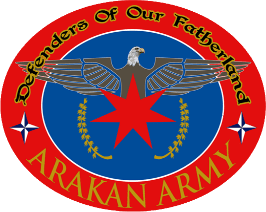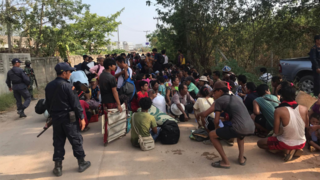
The Rohingya people are a stateless ethnic group who predominantly follow Islam and reside in Rakhine State, Myanmar. Before the Rohingya genocide in 2017, when over 740,000 fled to Bangladesh, an estimated 1.4 million Rohingya lived in Myanmar. Described by journalists and news outlets as one of the most persecuted minorities in the world, the Rohingya are denied citizenship under the 1982 Myanmar nationality law. There are also restrictions on their freedom of movement, access to state education and civil service jobs. The legal conditions faced by the Rohingya in Myanmar have been compared to apartheid by some academics, analysts and political figures, including Nobel laureate Bishop Desmond Tutu, a South African anti-apartheid activist. The most recent mass displacement of Rohingya in 2017 led the International Criminal Court to investigate crimes against humanity, and the International Court of Justice to investigate genocide.

Myanmar has been embroiled in armed conflict since 1948, when the country, then known as Burma, gained independence from the United Kingdom. The conflict has largely been ethnic-based, with ethnic armed organisations fighting Myanmar's armed forces, the Tatmadaw, for self-determination. Despite numerous ceasefires and the creation of autonomous self-administered zones in 2008, armed groups continue to call for independence, increased autonomy, or the federalisation of Myanmar. It is the world's longest ongoing civil war, spanning almost eight decades.

Maungdaw is a town in Rakhine State, in the western part of Myanmar (Burma). It is the administrative seat of Maungdaw Township and Maungdaw District. Bordering Bangladesh, Maungdaw is home to one of 2 official border trade posts with Bangladesh.

The Rohingya conflict is an ongoing conflict in the northern part of Rakhine State, Myanmar, characterised by sectarian violence between the Rohingya Muslim and Rakhine Buddhist communities, a military crackdown on Rohingya civilians by Myanmar's security forces, and militant attacks by Rohingya insurgents in Buthidaung, Maungdaw, and Rathedaung Townships, which border Bangladesh.

The Arakan Army, sometimes referred to as the Arakha Army, is an ethno-nationalist armed organisation based in Rakhine State (Arakan). Founded in April 2009, the AA is the military wing of the United League of Arakan (ULA). It is currently led by Commander-in-Chief Major General Twan Mrat Naing and vice deputy commander-in-chief Brigadier General Nyo Twan Awng. It is the military wing of the Rakhine ethnic people in Rakhine state where they are the majority. They seek greater autonomy from the Myanmar's central government and wants to restore the sovereignty of Arakan people. It was declared a terrorist organization in 2020 by Myanmar, and again by the State Administration Council junta in 2024.

The Rohingya Solidarity Organisation (RSO) is a Rohingya insurgent group and political organisation. It was founded in 1982 following a large scale military operation conducted by the Tatmadaw. The group discontinued its armed rebellion in 1998 but rearmed shortly after the 2021 Myanmar coup d'etat.

The Arakan Liberation Army is a Rakhine insurgent group in Myanmar (Burma). It is the armed wing of the Arakan Liberation Party (ALP). The ALA signed a ceasefire agreement with the government of Myanmar on 5 April 2012.

The Arakan Rohingya Salvation Army (ARSA), formerly known as Harakah al-Yaqin, is a Rohingya insurgent group active in northern Rakhine State, Myanmar. According to a December 2016 report by the International Crisis Group, it is led by Ataullah abu Ammar Jununi, a Rohingya man who was born in Karachi, Pakistan, and grew up in Mecca, Saudi Arabia. Other members of its leadership include a committee of Rohingya émigrés in Saudi Arabia.

Violent clashes have been ongoing in the northern part of Myanmar's Rakhine State since October 2016. Insurgent attacks by the Arakan Rohingya Salvation Army (ARSA) have led to sectarian violence perpetrated by Myanmar's military and the local Buddhist population against predominantly Muslim Rohingya civilians. The conflict has sparked international outcry and was described as an ethnic cleansing by the United Nations High Commissioner for Human Rights. In August 2017, the situation worsened and hundreds of thousands of refugees fled Myanmar into Bangladesh, with an estimated 500,000 refugees having arrived by 27 September 2017. In January 2019, Arakan Army insurgents raided border police posts in Buthidaung Township, joining the conflict and beginning their military campaign in northern Rakhine State against the Burmese military.

The Bangladesh–Myanmar border is the international border between the countries of Bangladesh and Myanmar. The border stretches 271.0 kilometres, from the tripoint with India in the north to the Bay of Bengal in the south. About 210 km (130 mi) of the border is fenced, with the government of Myanmar announcing in 2017 that it was planning to fence off the rest of the border.

The Myanmar Civil War, also known as the Burmese Civil War, Burmese Spring Revolution or People's Defensive War, is an ongoing civil war since 2021. It began following Myanmar's long-running insurgencies, which escalated significantly in response to the 2021 coup d'état and the subsequent violent crackdown on anti-coup protests. The exiled National Unity Government and major ethnic armed organisations repudiated the 2008 Constitution and called instead for a democratic federal state. Besides engaging this alliance, the ruling government of the State Administration Council (SAC), also contends with other anti-SAC forces in areas under its control. Hannah Beech of The New York Times observed the insurgents are apportioned into hundreds of armed groups scattered across the country.
The following is a timeline of major events during the Myanmar civil war (2021–present), following the 2021 military coup d'état and protests. It was also a renewed intensity in existing internal conflict in Myanmar.
This is the list of important events happened in Myanmar in 2023.
The Three Brotherhood Alliance ;, also known as Brotherhood Alliance, is an alliance between the Arakan Army, Myanmar National Democratic Alliance Army, and the Ta'ang National Liberation Army formed in June 2019.
This is the list of important events happened in Myanmar in 2024.

On 13 November 2023, the Arakan Army (AA), an ethnic resistance group active in the civil war in Myanmar, launched a military offensive against Myanmar's military junta in Rakhine and southern Chin State. Fighting began concurrently with the launch of Operation 1027, which the Arakan Army, as a member of the Three Brotherhood Alliance, also participated in. The offensive broke an informal ceasefire between the Arakan Army and the junta that had been in place for a year. During the offensive, the Arakan Army captured several towns in northern Rakhine, including Mrauk U, the capital of Mrauk-U District and the historical capital of Arakan. These gains gave them total control over most of northern Arakan. The Arakan Army followed these successes by besieging Sittwe, the state capital, and Ann, the headquarters of the junta's western command. They also launched offensives in the southern parts of the state, capturing several towns and throwing junta forces into disarray. The International Institute for Strategic Studies reported that the Arakan Army's sweeping gains "are already enough to enable self-rule over a large portion of the Rakhine homeland and to reshape the wider balance of power in Myanmar."

The ongoing Myanmar civil war has had an impact on neighbouring countries. Refugees and junta officials have fled into Bangladesh, India and Thailand. Territorial violations of Bangladeshi territory, such as artillery strikes and firing at vessels near St. Martin's Island, have caused border tensions. In India, the conflict also contributed to the 2023–2024 Manipur violence.
The Arakan Rohingya Army (ARA) is an ethnic Rohingya insurgent group founded by Nabi Hossain and Abdullah Kane.
On April 10, 2021, fighters from the Ta'ang National Liberation Army (TNLA) and Myanmar National Democratic Alliance Army (MNDAA) attacked a police station controlled by Tatmadaw, killing fourteen police officers. The Naungmon ambush was the first attack by the 3BA during the Myanmar civil war and after the 2021 Myanmar coup d'état.
The Burning of Buthidaung refers to the deliberate burning of much of Rohingya-majority town of Buthidaung, likely by the Arakanese insurgent Arakha Army. The fire occurred shortly after the Arakha Army captured the town during their offensive in Rakhine State, Myanmar.











